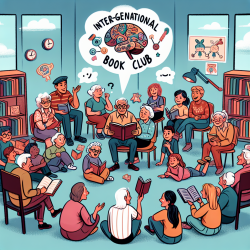Introduction
In the ever-evolving field of speech-language pathology, leveraging innovative interventions to enhance cognitive and social outcomes for older adults is crucial. The pilot study titled How an Intergenerational Book Club Can Prevent Cognitive Decline in Older Adults: A Pilot Study provides valuable insights into how intergenerational book clubs can serve as a promising approach to prevent cognitive decline. This blog explores the findings of the study and discusses how practitioners can implement these insights to improve outcomes for older adults.
Understanding the Study
The study investigated the impact of an intergenerational book club on older adults' cognitive function and social engagement. Participants included senior adults and college students who engaged in weekly book club meetings, alternating between in-person and virtual formats. The study aimed to determine whether this model could improve cognitive function, as measured by the Montreal Cognitive Assessment (MoCA), and enhance social engagement.
Key Findings
While the study found no significant changes in measures of quality of life and affect, a notable improvement in cognitive function was observed among book club participants compared to controls. Specifically, the MoCA scores of participants improved significantly, suggesting that the cognitive stimulation and social interaction inherent in the book club format could contribute to cognitive resilience.
Implications for Practice
For speech-language pathologists, the study highlights the potential of intergenerational programs to enhance cognitive engagement in older adults. Here are some practical steps practitioners can take:
- Incorporate Social Engagement: Encourage participation in social activities that promote cognitive engagement. Intergenerational book clubs offer a platform for older adults to engage in meaningful discussions, fostering both cognitive and social stimulation.
- Leverage Technology: The alternating in-person and virtual meeting format can be adapted to other interventions, offering flexibility and accessibility for participants.
- Focus on Cognitive Activities: Incorporate activities that stimulate cognitive function, such as reading and discussion, into therapy sessions to enhance cognitive reserve.
Encouraging Further Research
The study's promising results underscore the need for further research into intergenerational programs. Practitioners are encouraged to explore how these interventions can be tailored to diverse populations and settings. By expanding research efforts, the field can continue to develop evidence-based strategies that support cognitive health in older adults.
Conclusion
The intergenerational book club model presents a viable approach to enhancing cognitive and social outcomes for older adults. By integrating these insights into practice, speech-language pathologists can contribute to the development of innovative interventions that promote cognitive resilience and improve quality of life for older adults. To read the original research paper, please follow this link: How an Intergenerational Book Club Can Prevent Cognitive Decline in Older Adults: A Pilot Study.










